Opinion
A golden opportunity missed due to communal mindsets
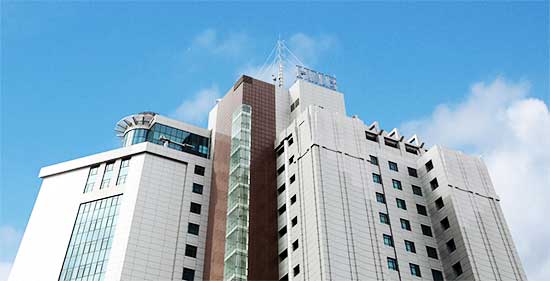
By Rienzie Wijetilleke
(rienzietwij@gmail.com), and
Kusum Wijetilleke
(kusumw@gmail.com)
There was a period in the late 80s and early 90s when Sri Lanka’s banking sector was beginning to expand its correspondent relationships around the world and strengthening these relationships through carefully structured facilities was critical. As the CEO of HNB, I was obliged to meet officials and counterparts of various banks around the world in order to negotiate our institutional relationships and thus expand and facilitate the growing import/ export industry as well as finalizing credit lines to Sri Lanka. On quite a number of occasions, I attended meetings in the UK and in various parts of Europe with heads of some of the leading banks in that region. We would discuss Sri Lanka and its economy, politics, the threat of terrorism whilst also working out trade products and negotiating funding lines. Every so often, I would hear remarks from the British and the Europeans regarding the size of our balance sheet. They would jokingly ask whether there are any zeroes missing from our balance sheet, implying that HNB was not of an adequate size to be considered a major financial player internationally.
A Sri Lankan Regional Financial Force
When I studied the local industry at the time, it became apparent that culturally, the banking industry had an issue. The State owned and controlled banks such as BOC and People’s Bank had a major advantage due to their large deposit base and state backing, yet their loan portfolio was much weaker, mainly due to lending to State Owned Enterprises. At that time, due to state ownership, these banks viewed risk differently to private commercial banks. HNB was lending to a myriad of industries which were in their infancy but with a much smaller deposit base. Many of the private commercial banks had the necessary expertise to lend to large projects and new industries, but the institutions themselves were not large enough to participate in some of these transactions. This meant that a lot of the lending had to be syndicated with a foreign bank as well as with a state bank.
Thus, it became clear that HNB would have to grow its funding base in order to compete against the state banks and eventually against foreign banks in the region. Over many decades, Sri Lanka’s banking sector has evolved into a stable industry with an equally effective regulator and sound policy management. There was no reason why Sri Lanka’s finance industry could not find success in markets such as India, Pakistan, Bangladesh, Vietnam and Cambodia. My dream was that HNB would grow into a truly regional powerhouse, but this would require consolidation within the Sri Lankan industry to create a financial force that could compete regionally with a balance sheet large enough to entice investors.
HNB needed to buy over a competitor and perhaps through an amalgamated entity, try to enter foreign markets at least with basic financial products before expanding into infrastructure funding and investment banking. If we could start small and get our foot in the door in countries like Bangladesh and Vietnam, this Sri Lankan financial giant could open itself up to new opportunities in markets spread throughout the burgeoning South East Asian region. As the CEO of HNB, I had already overseen the purchase of the local branches of IndoSuez, Emirates Bank and Habib Bank and thus had the necessary confidence to oversee a larger, more meaningful acquisition/merger.
I engaged a few trusted advisors and we decided on presenting some preliminary numbers to key Board Members in private meetings. I had anticipated and received the unqualified support of the Chairman, the late Mr. Chrishantha Cooray and Director and one of its major shareholders: Mr. Harry Jayawardena (DHSJ). As Chairman, Mr. Cooray had always supported me, he was a thorough gentleman and always kept the organization’s best interests at heart. In DHSJ, I was always assured of the steadfast support of the country’s pre-eminent businessman and industrialist, someone that shared my vision. One sticking point was the need to raise fresh capital to partly finance the take-over. Mr. Cooray’s shareholding interest through Brown and Co. was unable to raise significant capital, but DHSJ was ready and willing to infuse the necessary capital. As CEO I had to walk a fine line, as both Mr. Cooray and DHSJ were dear friends of mine and at Mr. Cooray’s request, I had to agree not to take any action that might lead to a dilution of Brown and Co’s share-ownership.
Insecurity of the Regulator
Furthermore, many within the regulator were very much against what they perceived as an attempt by myself to promote individual ownership and domination of the banking industry in Sri Lanka. Personally, this was not a consideration for me, as I was responsible for the bank; a merger or acquisition was very much in the best interests of the organization. However given the sensitivity of the situation on all sides, I needed to be extremely tactful. It seemed obvious to me that the regulator was willing to forego international expansion to restrict individual domination of the industry and prevent a concentration of power. However, I was of the view that a consolidation would not only align with HNB’s vision, but was undoubtedly in the national interest.
Despite some reticence by members of the Board and Senior Management, I received the green light to do whatever needed to merge with or acquire Sampath Bank, even if it was interpreted as a hostile takeover. We opted for Sampath because of the enormous potential it showed at that time. I admired some of their senior management and indeed I even counted as friends some amongst their directorate, but our vision was more important than personal relationships. HNB had an opportunity and the entire country and economy would benefit from a consolidation which would have been unprecedented in Sri Lanka.
At the time, it was my expectation that the regulatory authority would have backed the creation of a Sri Lankan regional financial entity, given the obvious advantages it would bring to Sri Lanka. However, during the initial negotiations, it became apparent that Sri Lanka’s communal divisions had poisoned the hearts and minds of so many Sri Lankans: there was resistance from unexpected quarters.
Communal Divisions come to the Fore
Hatton National Bank, with its roots in the hill-country town of Hatton, was initially known to be a bank that served the plantation industry. Over the years, through the efforts of many, we successfully shed this image and created a new one. HNB came to be known as a “Partner in Progress” to all Sri Lankans and one of the things I am most proud of from my time as CEO was the Gami Pubuduwa scheme which was targeted at Sri Lankans around the country living outside urban areas, to provide them with lines of credit that were sorely lacking. I was also proud that HNB, especially during the mid-90s, had hired some of Sri Lanka’s brightest sportsmen and women, especially cricketers, both household names and up and coming youngsters with enormous potential. At HNB we celebrated all cultures and we would not spare any expense for Bakthi Gee and Christmas events for staff. HNB had become a truly multicultural organization.
To my surprise and utter disappointment, many people involved in the negotiations seemed to consider HNB a “Tamil Bank”. Thus, any potential takeover of Sampath was suddenly viewed through the lens of communal division. The idea of creating a regional powerhouse was now framed as a hostile acquisition of a ‘Sinhala’ Bank by a ‘Tamil’ Bank.
Personal Attacks and Posters
During the coming months, some enterprising members of the Sampath Bank Union began printing “kalapathara” (posters) making various allegations about HNB, its Directors and its management, myself included. HNB’s attempted takeover of Sampath was seen as part of a movement to dilute the Sinhalese culture, and I was viewed as the foremost villain in this story; the Sinhala Buddhist CEO who was selling his people out. There were various threats issued to me and my family. The Board of Directors at HNB was so concerned that they arranged a special security detail for me. We had to shuffle some of the staff that were working under me due to allegations that they were involved. I had to warn my wife that only specific staff would be allowed to enter my residence. On many evenings we received phone calls, with a variety of threats made against me personally and against my family, some of the language used I dare not repeat. On one occasion my youngest son, who was barely a teenager at the time had answered the telephone when my wife and I were not in the house. He conveyed to us that a man had called asking for me had then proceeded to scold my son in filth and warn him that his father’s limbs would be broken soon.
Senior officials of the Central Bank would call me at odd hours and we would discuss the move at length. The accusation was that HNB was trying to take over the banking industry, but I kept repeating that we were trying to consolidate, not dominate. Many at the CBSL were worried about monopolies and I sensed they had been listening to other industry professionals who were against potential domination of the industry by HNB. I can state as fact that I know of some very prominent bankers who despite seeing the obvious advantages, did not want to see HNB succeed in this venture.
The Dream that Died
As the war went from bad to worse, with bombs striking in the business district in Colombo and the government of Sri Lanka not having adequate means to respond, the temperature was starting to increase. The pressures were immense, the negative publicity around the merger/acquisition plus my additional responsibilities were starting to take its toll and I could not in good conscience endanger my family any further. Whilst I had the support of most of the Directorate at HNB, I realized that politically, the transaction would be painted by the communal narrative; the well had been poisoned.
As I think back, the idea to build a major regional financial player would most certainly have succeeded and the rewards would have been handsome. Take the example of Mr. Ishara Nanayakkara and the recent $600 Mn transaction involving the sale of shares in his Cambodian finance company, PRASAC. LOLC and Mr. Nanayakkara are reaping the rewards of taking a long-term view and diversifying into frontier markets with immense growth potential.
In the 90s, South East Asia and the Asian region as a whole was on the cusp of an economic boom. Young economies such as Vietnam and Bangladesh were starting to get organized and open up for trade and investment. An entity with the expertise of HNB and Sampath Bank with a large balance sheet would have taken a foothold in many of these markets and would have enjoyed a stake in their shared prosperity.
Unfortunately, small minds prevailed and Sri Lanka’s communal divisions would continue to dictate the country’s policies and initiatives, it might be argued that this sorry state of affairs still continues to this day.
- News Advertiesment
See Kapruka’s top selling online shopping categories such as Toys, Grocery, Flowers, Birthday Cakes, Fruits, Chocolates, Clothing and Electronics. Also see Kapruka’s unique online services such as Money Remittence,News, Courier/Delivery, Food Delivery and over 700 top brands. Also get products from Amazon & Ebay via Kapruka Gloabal Shop into Sri Lanka.
Opinion
Take Human Rights seriously, not so much the council or office
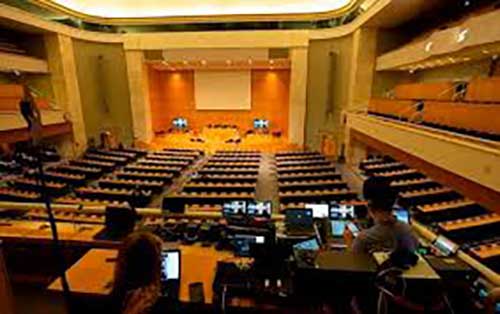
By Dr Laksiri Fernando
The 46th Session of the UN Human Rights Council started on 22 February morning with obvious hiccups. The Office, to mean the Office of the UN High Commissioner for Human Rights, finally decided to hold all sessions virtually online, only the President of the Council and the assistants in the high table sitting at the UN Assembly Hall in Geneva. The President, Ms. Nazhat Shammen Khan, Ambassador from Fiji in Geneva, wearing a saree, was graceful in the chair with empty seats surrounding.
In the opening session, the UN General Assembly President, UN General Secretary, UN High Commissioner for Human Rights, and Head of Foreign Affairs, Switzerland (as the host country), addressed remotely the session. In fact, there was no need for Switzerland to have a special place, as the UN is independent from any host country. Switzerland is fairly ok, however, if this tradition is followed, the UN General Assembly may have to give a special place to the US in New York.
Initial Addresses
UN General Secretary, Antonio Guterres’ address could have been quite exemplary if he gave a proper balance to the developed and developing countries. He talked about racism and fight against racism but did not mention where racism is overwhelmingly rampant (US and Europe) and what to do about it. Outlining the human rights implications of Covid-19 pandemic, he made quite a good analysis. It was nice for him to say, ‘human rights are our blood line (equality), our lifeline (for peace) and our frontline (to fight against violations).’ However, in the fight against violations, he apparently forgot about the ‘blood line’ or the ‘lifeline’ quite necessary not to aggravate situations through partiality and bias. He never talked about the importance of human rights education or promoting human rights awareness in all countries.
His final assault was on Myanmar. Although he did not call ‘genocide,’ he denounced the treatment of Rohingyas as ethnic cleansing without mentioning any terrorist group/s within. His call for the release of Aung San Suu Kyi and other civilian leaders undoubtedly should be a common call of all. However, he did not leave any opening for a dialogue with the military leaders or bring back a dialogue between Aung San and Min Aung, the military leader. With a proper mediation, it is not impossible. Calling for a complete overhaul as the young demonstrators idealistically claim might not be realistic.
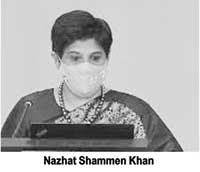 High Commissioner Michelle Bachelet’s address was brief and uncontroversial this time without mentioning any country or region. It is clear by now perhaps she is not the real author of the Report against Sri Lanka, but someone probably hired by the so-called core-group led by Britain. Her major points were related to the coronavirus pandemic trying to highlight some of the socio-economic disparities and imbalances of policy making that have emerged as a result. The neglect of women, minorities, and the marginalized sections of society were emphasized. But the poor was not mentioned. As a former medical doctor, she also opted to highlight some of the medical issues underpinning the crisis.
High Commissioner Michelle Bachelet’s address was brief and uncontroversial this time without mentioning any country or region. It is clear by now perhaps she is not the real author of the Report against Sri Lanka, but someone probably hired by the so-called core-group led by Britain. Her major points were related to the coronavirus pandemic trying to highlight some of the socio-economic disparities and imbalances of policy making that have emerged as a result. The neglect of women, minorities, and the marginalized sections of society were emphasized. But the poor was not mentioned. As a former medical doctor, she also opted to highlight some of the medical issues underpinning the crisis.
Then came the statements from different countries in the first meeting in the following order: Uzbekistan, Colombia, Lithuania, Afghanistan, Poland, Venezuela, Finland, Fiji, Moldova, Georgia, Kazakhstan, Equatorial Guinea, Vietnam, Belgium, and Morocco. The obvious purposes of these statements were different. Some countries were apparently canvassing for getting into the Human Rights Council at the next turn perhaps for the purpose of prestige. Some others were playing regional politics against their perceived enemies. This was very clear when Lithuania and Poland started attacking Russia.
But there were very sincere human rights presentations as well. One was the statement by the President of Afghanistan, Mohammad Ashraf Ghani. He outlined the devastating effects that Afghanistan had to undergo during the last 40 years, because of foreign interferences. The initial support to Taliban by big powers was hinted. His kind appeal was to the UN was to go ‘beyond discourse to practice’ giving equal chance to the poor and the developing countries to involve without discrimination.
Controversial Presentations
China’s Foreign Affairs Minister, Wang Yi, made his presentation almost at the end of the first day. This is apparently the first time that China had directly addressed the Human Rights Council. Beginning with outlining the devastating repercussions of the coronavirus pandemic he stressed that the world should face the challenges through ‘solidarity and cooperation.’ He broadened the concept to human rights solidarity and cooperation. His expressed views were quite different to the others, particularly to the Western ones.
He frankly said that what he expresses are the views of China on human rights without claiming those are absolute truths or forcing others to believe or implement them. There were four main concepts that he put forward before the member countries. First, he said, “We should embrace a human rights philosophy that centres on the people. The people’s interests are where the human rights cause starts and ends.” Second, he said, “we should uphold both universality and particularity of human rights. Peace, development, equity, justice, democracy, and freedom are common values shared by all humanity and recognized by all countries.” “On the other hand,” he said, “countries must promote and protect human rights in light of their national realities and the needs of their people.”
“Third,” he said, “we should systemically advance all aspects of human rights. Human rights are an all-encompassing concept. They include civil and political rights as well as economic, social, and cultural rights.” He then emphasized, “Among them, the rights to subsistence and development are the basic human rights of paramount importance.” Fourth, “we should continue to promote international dialogue and cooperation on human rights. Global human rights governance should be advanced through consultation among all countries.”
It was on the same first day before China, that the United Kingdom launched its barrage against several countries not sparing Sri Lanka. The Foreign Secretary, Dominic Raab, delivered the statement from top to bottom attacking alleged violating countries on human rights. But there was no mentioning of Israel for the repression of Palestinians or the systemic racism rampaging in the United States, including the 6 January attacks on the Capitol by extremist/terrorist groups.
His first sermon was on Myanmar without acknowledging the British atrocities or mismanagement of this poor and diverse country during the colonial period. He was quite jubilant over implementing sanctions and other restrictions over the country. Many sanctions, in my opinion, are extortions. Undoubtedly, Aung San Suu Kyi and other leaders should be released, and democracy restored. This is a task of the whole council and when one or two countries try to grab the credit, there can be obvious reservations of others.
His further scathing attacks were against Belarus, Russia, and China. Some appeared factually correct but not necessarily the approach or the motives genuine. The following is the way he came around Sri Lanka. He said,
“Finally, we will continue to lead action in this Council: on Syria, as we do at each session; on South Sudan; and on Sri Lanka, where we will present a new resolution to maintain the focus on reconciliation and on accountability.”
‘Action’ to him basically means repeatedly passing resolutions, of course imposing economic and other sanctions. He said, “as we do at each session”; like bullying poor or weak countries at each session. Can there be a resolution against Russia or China? I doubt it.
What would be the purpose of presenting a resolution against Sri Lanka? As he said, “to maintain the focus on reconciliation and on accountability.” This will satisfy neither the Tamil militants nor the Sinhalese masses. But it might satisfy the crafty Opposition (proxy of the defeated last government). This is not going to be based on any of the actual measures that Sri Lanka has taken or not taken on reconciliation or accountability. But based on the ‘Authoritarian and Hypocritical Report’ that some anti-Sri Lankans have drafted within the Office of the High Commissioner for Human Rights. This what I have discussed in my last article.
In this context, successful or not, the statement made by the Sri Lanka’s Minister of External Affairs, Dinesh Gunawardena, in rejecting any resolution based on the foxy Report of the Office of the UN High Commissioner for Human Rights, in my concerned opinion, is absolutely correct.
Opinion
President’s energy directives ignored by the Power Ministry: Another Point of View
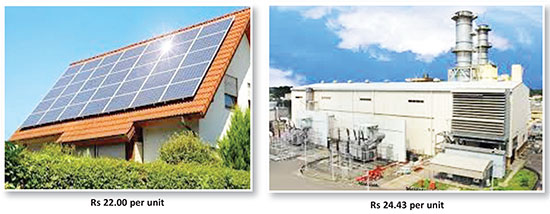
Dr Tilak Siyambalapitiya
Dr Janaka Rathnasiri laments (The Island 19 Feb 2021) that the Power Ministry has ignored the President’s directive to draw 70% of energy from renewable sources by 2030. I saw the approved costs of electricity production for 2019, published by the Public Utilities Commission (PUCSL).
PUCSL has also approved the prices to sell electricity to customers. Although various customers pay at various “approved” prices, the average income from such “approved” prices in 2019 was Rs 17.02 per unit. It is not only the Ministry, according to Dr Rathnasiri, ignoring the President; PUCSL is also breaking the law, which says prices and approved costs should be equal.
 So there is already an illegal gap of Rs 21.59 minus 17.02 = Rs 4.57 per unit of electricity sold. If electricity prices are not to be increased, as stated by many in the government and PUCSL, let us say the following: Distribution costs should decrease by 0.57 Rs per unit. Generation costs should decrease by Rs 4.00 per unit.
So there is already an illegal gap of Rs 21.59 minus 17.02 = Rs 4.57 per unit of electricity sold. If electricity prices are not to be increased, as stated by many in the government and PUCSL, let us say the following: Distribution costs should decrease by 0.57 Rs per unit. Generation costs should decrease by Rs 4.00 per unit.
PUCSL also published the approved cost of purchasing or producing electricity from various sources for 2019. The actual energy values were different to what was approved, but let us stick to PUCSL approved figures:
I suggest Dr Rathnasiri fills-up the following table, to show how much electricity will cost in 2030 to produce and deliver, if the President’s 70% target is to be achieved and for PUCSL to abide by the law. Let us assume that electricity requirement in 2030 will be double that of 2019.
 Since PUCSL has to save Rs 4 from 13.92, the average selling price for energy should be Rs 13.92 minus 4.00 = Rs 9.92. With a target network loss of 7% (in 2019 it was 8.4%), the average cost of production has to be Rs 9.27 per unit. Eight cages have to be filled-up by Dr Rathnasiri.
Since PUCSL has to save Rs 4 from 13.92, the average selling price for energy should be Rs 13.92 minus 4.00 = Rs 9.92. With a target network loss of 7% (in 2019 it was 8.4%), the average cost of production has to be Rs 9.27 per unit. Eight cages have to be filled-up by Dr Rathnasiri.
In 2012, PUCSL approved the energy cost of electricity produced from coal power to be 6.33 Rs per kWh. In 2019, PUCSL approved 9.89 (56% increase). For renewable energy, it was 13.69 in 2012, and 19.24 in 2019 (a 40% increase, but double the price of electricity from coal fired generation). In 2012, rooftop solar was not paid for: only give and take, but now paid Rs 22, against Rs 9.89 from coal. There seems to be something wrong. The price reductions of renewable energy being promised, being insulated from rupee depreciation, are not happening? Either Sri Lanka must be paying too little for coal, or it may be renewable energy is severely over-priced?
On coal we hear only of some corruption every now and then; so Sri Lanka cannot be paying less than it costs, for coal.
Enough money even to donate
vaccines
 Another reason for the Ministry of Power to ignore the President’s directive may be the Ministry’s previous experience with similar Presidential directives. In 2015, the President at that time cancelled the Sampur coal-fired power plant, and the Ministry faithfully obliged. That President and that Prime Minister then played ball games with more power plants until they were thrown out of power, leaving a two-billion-dollar deficit (still increasing) in the power sector. Not a single power plant of any description was built.
Another reason for the Ministry of Power to ignore the President’s directive may be the Ministry’s previous experience with similar Presidential directives. In 2015, the President at that time cancelled the Sampur coal-fired power plant, and the Ministry faithfully obliged. That President and that Prime Minister then played ball games with more power plants until they were thrown out of power, leaving a two-billion-dollar deficit (still increasing) in the power sector. Not a single power plant of any description was built.
Where is this deficit? You do not have to look far. In the second table, replace 24.43 with 9.89, to reflect what would have happened if Sampur was allowed to be built. The value 12.79 will go down to 8.55, well below the target of Rs 9.27 per unit to produce. Not only would CEB and LECO report profits, but the government too could have asked for an overdraft from CEB to tide over any cash shortfalls in the treasury. All this with no increase in customer prices. Producers of electricity from renewable energy could enjoy the price of 19.24 Rs per unit. And that blooming thing on your rooftop can continue to enjoy Rs 22 per unit. The Minister of Power, whom Dr Rathnasiri wants to replace with an army officer, would have been the happiest.
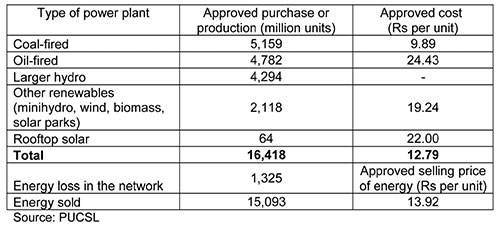 In the absence of Sampur (PUCSL’s letter signed by Chairman Saliya Mathew confirmed cancellation and asked CEB not to build it), PUCSL approved electricity to be produced at Rs 21.59 and sold at Rs 17.02 per unit. The annual loss would be Rs (21.59 – 17.02) x 15,093 = Rs 69 billion per year of approved financial loss. Sri Lanka has a Telecom regulator, an Insurance regulator, a Banking regulator, who never approve prices below costs. Sometime ago the telecom regulator asked the operators to raise the prices, when operators were proposing to reduce prices amidst a price war. But the electricity industry regulator is different: he approves costs amounting to 27% more than the price, not just once but, but continuously for ten long years !
In the absence of Sampur (PUCSL’s letter signed by Chairman Saliya Mathew confirmed cancellation and asked CEB not to build it), PUCSL approved electricity to be produced at Rs 21.59 and sold at Rs 17.02 per unit. The annual loss would be Rs (21.59 – 17.02) x 15,093 = Rs 69 billion per year of approved financial loss. Sri Lanka has a Telecom regulator, an Insurance regulator, a Banking regulator, who never approve prices below costs. Sometime ago the telecom regulator asked the operators to raise the prices, when operators were proposing to reduce prices amidst a price war. But the electricity industry regulator is different: he approves costs amounting to 27% more than the price, not just once but, but continuously for ten long years !
That is 370 million dollars per year as of 2019, the economy is spending, and for years to come, to burn oil (and say we have saved the environment). Did the Minister of Health say we are short of 160 million dollars to buy 40 million doses of the vaccine? Well, being a former Minister of Power, she now knows which Presidential “order” of 2015 is bleeding the economy of 370 million dollars per year, adequate to buy all vaccines and donate an equal amount to a needy country.
Prices are the production costs approved by PUCSL for 2019. The selling price approved by the same PUCSL was Rs 9.27 per unit.
Opinion
Confusion on NGOs and NSOs in Sri Lanka
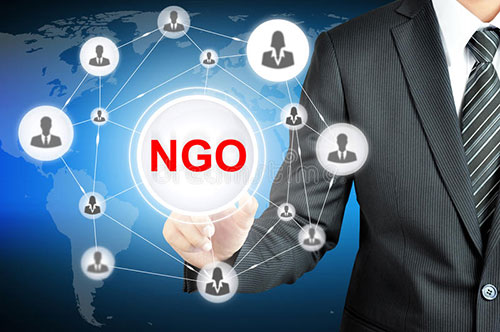
If you listen to politicians and journalists here, you will hear of that curious creature rajya novana sanvidane, a Non-State Organization (NSO). Where do you get them? In the uninstructed and dead minds of those who use those terms. In the real world, where politicians and journalists have developed minds, there are Non-Governmental Organizations (NGO). The United Nations is an organization set up by state parties, not by governments. It is true that agents of states, governments, make the United Nations work or fail. Governments may change but not the states, except rarely. When Eritrea broke away from Ethiopia, a new state was formed and was so recognised by the United Nations. However, the LTTE that tried to set up another state was crushed by the established state that it tried to break away from, and the UN had nothing to do with them.
This entirely unnecessary confusion, created out of ignorance, is so destructive that organizations completely loyal to the existing state, are made to be traitorous outfits, for they are ‘non-state organizations’ within the state. There are citizens of each state, but no citizens of any government. Government is but an instrument of the state. In most states there are organizations, neither of the state nor of government: religious organizations including churches. But none of them is beyond the pale of the state.
Those that speak of rajya novana sanvidane give that name partly because they have no idea of the origin of non-governmental organizations. NGOs came into the limelight, as donor agencies, noticed that some governments, in East Africa, in particular, did not have the capacity and the integrity to use the resources that they provided. They construed, about 1970, that NGOs would be a solution to the problem. Little did they realize that some NGOs themselves would become dens of thieves and brigands. I have not seen any evaluation of the performance of NGOs in any country. There was an incomplete essay written by Dr. Susantha Gunatilleka. NGOs are alternatives to the government, not to the state.
Our Constitution emphatically draws a distinction between the government and state, and lays down that the President is both Head of Government and Head of State (Read Article 2 and Article 30 of the Constitution.) It is as head of state that, he/she is the Commander of the Armed Forces, appoints and receives ambassadors and addresses Parliament annually, when a prorogued Parliament, reconvenes. He/she presides over the Cabinet as head of government. The distinction is most clear, in practice, in Britain where Queen Elizabeth is the head of state and Boris Johnson is the Prime Minister and head of government. However, in principle, Johnson is the Queen’s First Minister appointed by the sovereign, and resigns by advising her of his decision to do so.
In the US and in India the term ‘state’ has special significance. In India there is a ‘rajya sabha’ (the Council of States) whose members represent constituent States and Union Territories. Pretty much the same is true of the United States. In the US, executive power is vested in the President and heads the administration, government in our parlance. The Head of State does not come into the Constitution but those functions that one associates with a head of state are in the US performed by the President of the Republic. The US President does not speak of my state (mage rajaya) but of my administration, (mage anduva). Annually, he addresses Congress on the State of the Union. Our present President must be entirely familiar with all this, having lived there as a citizen of the US for over a decade. It is baffling when someone speaks of a past state as a traitor to that same state. It is probable that a government was a traitor to the state. ‘Treason against the United States, shall consist only in levying war against them, or in adhering to their (States’) enemies, giving them aid and comfort’. That a state was a traitor to the same state is gobbledygook.
Apart from probable confusion that we spoke of in the previous paragraph, it is probable that a president and other members of a government, including members of the governing party here, find it grandiloquent to speak of his/her/their state (mage/ape rajaya), rather than my government (mage anduva) or Sirisena anduva’ and not Sirisena state; it was common to talk of ‘ape anduva’ in 1956; politicians in 1956 were far more literate then than they are now.
When translating from another language, make sure that you understand a bit of the history of the concept that you translate. A public school in the US is not the same as a public school in the UK.
MAHADENAMUTTA









